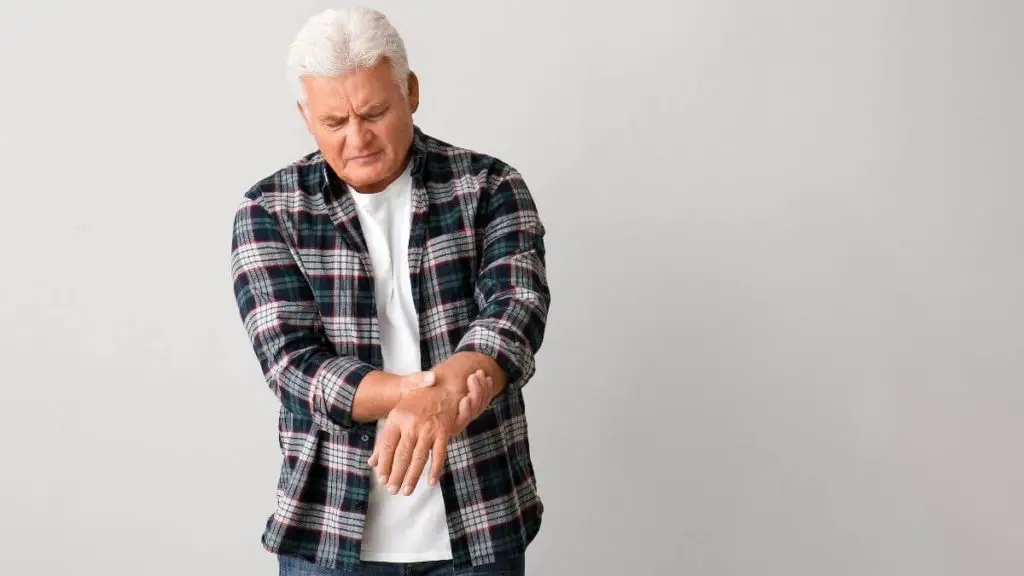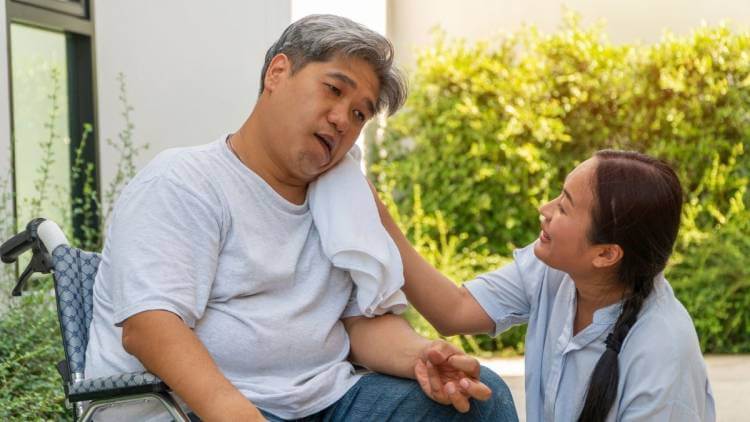It is somewhat normal when old people shake, but many older people often consider this a warning sign of serious diseases. Nearly 25 million senior citizens around the globe face the problem of tremors, and many of them are left startled as to what the medical issue is behind this shaking and trembling.
There are tons of reasons why old people shake. Sometimes, it is because of a specific medical condition like low blood sugar. Alternatively, a genetic or hereditarian problem could be transferred to an individual from their family.
There is no definite medication to ward off shaking regarding the cure for tremors, but some medicines and physiotherapeutic methods prove crucial in controlling tremors or shaking. If you try to understand why old people shake, you have come to the right place.
What is it Called When Old People Shake?
From the medical point of view, when an old person shakes, it is called an “Essential Tremor” (ET). Essential tremor is a neurological disorderly condition in which the patient suffers from the rhythmic shaking of hands, arms, feet, legs, head, and voice.
It is pertinent to mention that this shaking is not to be confused with Parkinson’s Disease, although they have somewhat similar implications. Generally, old age shaking is referred to and treated as essential tremor. However, specific symptoms can also signify the dominance of other diseases.
Why do Old People Shake?
Shakes in older adults are caused owing to different medical and non-medical conditions. Some situations are not considered severe medical ailments, while some may soon raise a red flag for a possible worsening condition. Moreover, we also have to disband the confusion that every older adult is facing the problem of shakes.
Not every older adult faces the problem of shakes; only a specific proportion of the elderly population lives with symptoms of tremors after the age of 60. There are 703 million elder (more than 65 years of age) people globally, and as iterated earlier, only 25 million suffer from shaking conditions. Therefore, it accounts for only 3% of the elderly population of the world.
Hence, one should discard the misconception that every older adult suffers from the shaking tremor condition. After nullifying the misbelief with statistics, let us have a detailed overview of why old people shake.
Following are the medical and non-medical borne reasons for shaking conditions in elders:
Tremors
Tremor is the most common and widely regarded reason for shaking in older persons. Tremor is a medical condition that arises from the neuro system. We understand that our brain is the movement controller of the body. The brain transmits neurological signals to the body parts for respective movement or functionality.
A tremor is a rhythmic movement of any body part unintentionally. Generally, fingers and hands are the most common body parts at the receiving end of tremors. However, any unwanted or uncontrolled movement is a tremor when you are not the controlling force behind the movement.
Tremors are generally of two types: active and rest. Hence, the shaking in elders is primarily due to tremors, and in most cases, it is not severe. While in very few cases, it may act as an initial warning sign for much-complicated medical conditions.
Active tremors are the uncontrolled movement of body parts when in motion. That type of tremor moves past unnoticed. On the other hand, the rest tremor occurs when the person is not moving, and an unintentional movement of body parts occurs. Rest tremors are easily recognizable compared to action tremors. Essential tremor is the most common medical terminology used to describe the shaking of elderly persons.
Multiple Sclerosis
Multiple sclerosis (MS) is a significant brain-related disease. MS causes the nervous breakdown of the brain and the central nervous system of the human body; as we know, the nervous system acts as the communication bridge between the brain and the rest of the body. Therefore, disruption of this communication will lead to stagnation and movement-related issues.
A condition of multiple sclerosis disrupts brain communication, and consequently, the uncontrolled movement of body parts occurs, referred to as MS tremors. Hence, MS is also a medical condition culminating in shaking and is common in elder persons. However, it can also be found in people from a younger age group suffering from a brain condition of MS.
Post-Traumatic Stress Disorder (PTSD)
Post-traumatic stress disorder is a common psychological disorder that causes significant behavioral and other physical changes. Shaking is not uncommon in PTSD patients.
During PTSD, the patient’s brain revisualizes the traumatic event that happened in the past. The patient is taken into a situation of delusion that the event is happening in the current period. It causes a sense of shock and utter instability in the patient’s brain. Resultantly, the patient cannot control the movement of the body parts.
If older adults have PTSD, they will also be most likely to suffer from shaking or tremor conditions. Therefore, the patient may shake excessively under the impact of PTSD. That is somewhat controllable if the proper counseling and medication for PTSD are administered to the patient. It will not be inaccurate to conclude that PTSD is also a significant factor that causes shaking in elderly persons.
Hypoglycemia
Hypoglycemia is a medical condition when a patient records a low blood sugar level. A state of hypoglycemia erupts when the blood sugar level of a person falls below 70 milligrams per deciliter (mg/dL). That condition will also result in low blood pressure.
A person suffering from hypoglycemia will face paleness, shakiness, headache, sweating, and hunger, among other issues. Shaking is an early symptom. Many older people may suffer a condition of hypoglycemia if they do not eat at regular intervals. Therefore, any condition of hypoglycemia is bound to bring shakiness along with it.
Hence, hypoglycemia is a common reason why old people shake. Not just the old people, any young person in a hypoglycemia situation will get tremors or uncontrollable shaking.
Anxiety and Depression
Depression is another crucial factor behind the shaking of older people. Anxiety and depression impact bodily movements in an abrupt manner; both can cause shaking. A person suffering from depression will have lesser control over the movement of the body parts.
Depression is a factor that is most directly related to the aging process. Depression causes the muscles to twitch, and as a result, the person will experience tremors. More specifically, tremors generated due to depression or anxiety are called psychogenic tremors.
Shaking results from depression and hence, a critical reason behind shaking. Older people have higher chances of undergoing depression with time. Therefore, psychogenic tremors are also more frequent in elderly persons of a population.
Hereditary Implication
Tremors are hereditary, prone to be carried along for generations. Certain tremors are thought to pass on the family tree from the genetic process. Therefore, you cannot rule out the hereditary cause of shaking.
If your parents are suffering from any tremor, you may also suffer shaking at any stage of your life. Hence, the genetic aspect of tremor transmission is also another reason why old people shake.
Parkinson’s Disease
Parkinson’s disease affects adults over 60 years old more commonly. The shakiness is produced by the brain’s nerve cells deteriorating. As a result, Parkinson’s sufferers’ muscle control deteriorates, and their overall life expectancy decreases.
Unintentional motions affect 80 percent of Parkinson’s patients. However, Parkinson’s disease isn’t the most common cause of older people shaking. Parkinson’s disease affects just approximately 1% of adults over the age of 60.
Stroke
Paralysis is another inflicting disease in which a person’s body movement stops. A specific portion of a person’s body ceases to move. Therefore, very slight rhythmic movement of the affected part of the body occurs in this condition.
The tremor is usually caused by strokes due to small vessel disease of the brain, in the areas supplied by the middle or posterior cerebral arteries which include the basal ganglia. These structures are responsible for relaying and regulating voluntary muscle contraction, and impaired function can thus lead to tremor and other movement disorders.
https://www.news-medical.net/health/Tremors-Following-Stroke.aspx
Hyperthyroidism
Hyperthyroidism occurs because of the overactive thyroid gland. The over-activation of the thyroid gland stimulates the body’s nervous system at a much higher rate. Consequently, the person suffering from hyperthyroidism will experience uncontrollable movements of hands and other body parts since the nervous system is overstimulated.
Hyperthyroidism is a medical condition common in millions of people, not just the older people in the world. Therefore, these people suffering from hyperthyroidism will surely experience shaking, tremors, or unintentional bodily movements.
Alcohol Abuse
Senior drug abuse is not uncommon, and alcohol abuse is another primary reason why old people shake. Overconsumption of alcohol will lead to the intervention in the nervous working mechanism. That has detrimental consequences since brain communication is badly affected.
The excessive use of alcohol will cause trembling and unintentional shaking of the body parts. Furthermore, that also happens when the alcoholics are treated during the rehabilitation process. The rehabilitators provide suitable medications to counter tremors due to alcoholism.
Medication Side Effects
Several medications are known to impact the movement of a person. Most notably, antidepressants and thyroid medication are the reasons behind unwanted movements of the body parts. Therefore, care must be taken while consuming these medicines, and only the prescribed quantity should be taken.
According to the Cleveland Clinic, the following medications can cause essential tremors:
- Albuterol
- Alcohol (see above)
- Anti-arrhythmic drugs
- Certain anti-depressants (Paxil, Prozac, Zoloft, Pamelor, etc.)
- Corticosteroids
- Cyclosporine
- Dilantin
- Lithium
- Reglan
- Ritalin
- Sudafed
- Tegretol
It is essential to take these medications with the prior approval of a medical practitioner to avoid the problem of tremors as a side effect.
Overconsumption of Caffeine
Caffeine is a commonly consumed product found in tobacco products, tea, and coffee. Caffeine releases the adrenaline hormones in the body. We clearly understand that excess of everything is terrible. The excess consumption of caffeine is also damaging to your health.
An excess caffeine intake will release adrenaline in huge quantities, which causes the shaking and unwarranted movement of the body parts. Hence, caffeine consumption is also a decisive factor in causing tremors. If this is the case, flush the caffeine out.
Brain Injury
The brain is the epitome of all the force behind the bodily movement. Any injury caused to the brain can reduce a person’s movement or working capacity. If a person suffers a brain injury, their body will lose contact with the brain to the extent of the injury.
We know that the nervous system communicates brain directions to the body. Any disruption in the process will halt bodily movement. Hence, a brain injury can result in unintentional body movements since the injury directly affects the nervous system.
FAQs
-
Are Tremors Normal in Seniors?
Yes, it is normal as it can be due to any of the medical reasons discussed above. On the other side of the picture, you can also find it in younger people if they resort to excessive alcoholism or suffer brain injuries.
-
Can Low Blood Pressure Cause Shaking?
Yes, low blood pressure can cause shaking in a person regardless of age. Lower blood pressure means the nervous communications are slowed down. Therefore, shaking, and delayed movements of body parts are common when a person’s blood pressure is low.
-
What Is Senile Tremor?
Involuntary shaking of the body or limbs in the elderly is known as senile tremors. It might be due to a medical or psychological issue. Hand tremors and shaking of the head are common early signs. Parkinson’s disease, which affects the nerve regions in the brain that govern the muscles, is frequently linked to senile tremors.
-
What Is the Problem of Trembling Limbs in Old Age?
Trembling limbs in old age affects 25 million older adults worldwide. That trembling of limbs is generally called essential tremor (ET). It can be for many different reasons. The above-discussed reasons for why old people shake comprehend the answer, and there can be any one of those reasons.
Concluding Thoughts
With the comprehensive overview of the above discussion, the query regarding old-age trembling should have been solved by now. It can be a combination of these or any of the reasons above. Regardless, shaking is not to be taken most of the time except for a few exceptional cases.
The best way to keep moving forward with tremors is to consult your physician immediately if you are suffering from a shaking problem. Your physician will ascertain the exact reason behind the shaking and prescribe you the medicine accordingly.
The crux is that these tremors are treatable per the respective medications, but you must ascertain the exact reason for these tremors to get adequate treatment.





